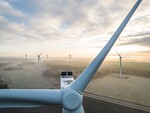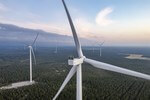News Release from WindEurope
Wind Industry Profile of
Clarity and visibility on auctions key to unlock Turkey’s onshore wind potential
WindEurope CEO Giles Dickson told participants that wind farms have continued to operate throughout the year in Europe as they were defined as an essential service by governments. The wind industry has also continued to build wind farms despite restrictions in the movements of workers and essential components. As for the manufacturing of new turbines, a number of factories experienced temporary closures at the height of the crisis in March and April, notably in Spain and Italy. But they have reopened and all 150 factories in Europe are now working again.
“Wind energy has been resilient during the ongoing COVID-19 pandemic for at least three reasons: wind is a local resource, which means that we don’t have to rely on energy imports; wind energy creates growth and jobs; and the wind industry has a strong supply chain in Europe and in other parts of the world. But it is also a globalised industry, which is why free trade is so important”, said Dickson.
Turkey has been no exception in this regard. It now has 8 GW of wind energy installed, which accounts for 8.5% of its electricity mix. It is in the Top 10 countries across the world in terms of installed capacity. 70 companies are involved in manufacturing wind turbines and components in Turkey, and this brings huge benefits to the Turkish economy: jobs, revenues, exports – Turkish factories are exporting wind turbines as far as Australia.
And wind has additional advantages in Turkey and elsewhere: onshore wind is now the cheapest form of new power generation in most of Europe. It brings benefits to the local populations, such as tax revenues to local governments, and it creates local jobs. It is good for the environment: wind energy emits no greenhouse gases nor other air pollutants, and uses very little water.
But the Turkish market currently lacks a clear perspective for investors and project developers. The Government has not yet extended the realisation periods for projects currently under construction that have been delayed due to COVID-19. And Turkey has not yet agreed on a new remuneration system since the YEKDEN / FiT scheme ends on 31 December 2020. Nor is there a clear schedule for the next YEKA auctions.
Dickson stressed that more clarity and flexibility on the timelines and design for wind energy auctions was needed for Turkey to take full advantage of all the benefits onshore wind can provide: “The wind industry needs the maximum possible flexibility on the commissioning deadlines for wind farms currently under construction”, he said – flexibility that Germany, France, Spain, Poland, Greece and others across Europe have all given.
“The industry also needs more clarity on the long-term auction arrangements. We need to know when the auctions are going to take place. There is a growing international demand for wind energy. The industry takes investment decisions for new factories and projects based on which countries offer the clearest visibility on their future auction pipeline”, Dickson added.
- Source:
- WindEurope
- Author:
- Press Office
- Link:
- windeurope.org/...
- Keywords:
- Turkey, WindEurope, onshore, wind farm, market, panel, TÜREB, resilience, COVID-19, corona, recovery, Giles Dickson



























